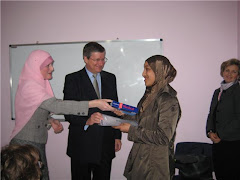 British / Algerian Relations in 2009
British / Algerian Relations in 2009
On Thursday the 22nd of January 2009, Hopeland Institute had the pleasure of welcoming His Excellency Andrew Henderson, British Ambassador in Algeria, and his wife, Julia, to give a talk in English on British / Algerian Relations in 2009.
He began by outlining a brief history to date:
· In 1585, Queen Elizabeth the 1st established the Barbary Trade Company which was granted a monopoly of trading in Algeria.
· John Tipton was the 1st British Consul to Algiers, largely a political move to gain Algeria’s support against Spain with whom the British had uncomfortable relations at the time.
· Elizabeth the 1st was succeeded by James the 1st who had better relations with Spain and therefore Algeria became less important to the British.
· Piracy followed
· The 1620’s, saw the notorious raid when Mourad Rais sailed to Ireland and captured 200 Irish. Apparently, according to one of our teachers who has been there, Baltimore, in Ireland, is like a mini Algiers!
· In 1816 Lord Exmouth was ordered to abolish slavery in Algeria and this was the first time that the British fired on Algiers
· In the 18th and 19th Century, British travellers to Algiers increased due to the belief that the climate was particularly good for one’s health. Books were even written in the 1850’s and 60’s about the advantages of living in Algiers! It was dubbed the ‘Torquay of North Africa’ and was certainly cheaper than Marseille!!!! There were even known British areas of the city.
· In the middle of 1867, the British Consul in Algiers, Robert Playfair, was appointed and he started raising money to build a church which was finally consecrated in 1871. It was situated where the Grande Poste now stands. A small cottage hospital was also built.
· 1942 – The Algerian coast was important in the 2nd World War as it was an allied landing. There are 5 cemeteries of British soldiers in Algeria who fought against the Germans (Oran, Annaba, Bejaia and two in Algiers).
· During the difficult years of the 1990’s, the British Embassy curtailed its activities and is still in the process of re-establishing itself here.
· In 2005, it moved temporarily to the Hilton hotel but whilst all credit is due to the hotel staff, these were just two incompatible functions and therefore the Embassy moved into a rented villa owned by Yaacef Saad.
· A new Embassy is currently being built and is due to be completed in April 2009 insha’Allah.
His Excellency then went on to explain the Embassy’s role in the current climate:
· A new embassy building is due to be completed by April 2009
· Services include the usual consular support to its own people, Algerians wanting to travel to the UK and commercial support to British companies wanting to develop relationships with Algerian companies
· Sharing of knowledge related to the war on terrorism and security and a police attaché for returning those requiring judicial services to their own country
· Talking with the Authorities about the issues of the day so currently that will include Gaza, Afghanistan and the Middle East Peace Process amongst other things
· Administration
Mr Henderson outlined the following priorities:
· The security of his staff and the embassy
· Counter terrorism
· Energy Issues
British Petroleum was one of the first major foreign investors in the energy field in Algeria and was followed by British Gas and Shell.
Great Britain gets 5% of its natural gas from Algeria but North Sea supplies are rapidly decreasing and therefore Algeria’s rich supply of this commodity makes it an important player in the ‘energy’ debate.
· Migration Issues
· ‘Algeria is Open for Business’
98% of Algeria’s export earnings currently come from oil and gas but Algeria is not just oil and gas!
His Excellency would like to see a variety of businesses working with Algeria in the near future. British companies currently in Algeria include Unilever, GlaxoSmithKline and HSBC which can only be a good sign.
· State visits
President Bouteflika last visited London in the Summer of 2006 but the Queen’s last state visit to Algeria was in 1980.
· Duration of Ambassador’s post
His Excellency explained that the post of Ambassador has historically been held for one to two years and that although he has already been in Algeria for 18 months, he hopes that a further 18 months will allow him to achieve more of his objectives.
Question Time
1. What’s happening with the British Council?
When British Council closed in the mid-90s they ran a teaching centre and a library. They returned in 2007 but with a slightly different focus. They are now working with the Ministry of Education to help raise the level of English language teaching in Algeria.
2. How large is the British community in Algeria?
A majority of British people in Algeria are transient, often working for 28 days at a time. There is also a community of British wives who have not registered with the Embassy but integrated themselves into Algerian communities. There are 250 registered with the Consulate.
3. How large is the Algerian community in the UK?
There are approximately 29,600 Algerians registered at the Algerian Embassy in London although the true number of Algerians in the UK is unknown. Figures have been estimated well into 50,000.
4. Why is there no British library?
Time has moved on and a library may not be the most efficient use of resources. An internet information centre may be more appropriate but this is something which will be looked into by the British Council in time bearing in mind that in general, internet use is less than 5% in the country.
5. Why are English books not represented at the International book fair?
This is a difficult event to manage due to getting materials in through the port in time so businesses are unwilling to take the risk of paying for a stand and then having nothing to display.
6. Does the British Embassy have the equivalent of the American RELO (Regional English Language Officer) and if so, would they be interested in visiting the school?
His Excellency promised to find this out and contact us with a name. Apparently there is someone who is currently working in Algeria and Tunisia who will be spending more time in Algeria in the future.
Interest in Education
His Excellency mentioned that whenever he visits a new city, he tries to ensure he visits the University. He is well aware that the number of students in the English departments is between 800-1000 wherever he goes and would like to see the Embassy being more ambitious than in the past, however, the current financial crisis in the UK may make this more difficult.
Chevening Scholarship Scheme – for more information, please see the Embassy website
There is also a plan to send 1000 teachers to the UK for additional training.
Graduation
Question Time was followed by the presentation of certificates to Medical English students and those who have completed level 5 General English. Students were also presented with Medical English or General English dictionaries respectively.
Social Gathering
The afternoon ended with drinks and nibbles in the ‘Bronx’, although whether His Excellency and his wife found time to drink anything was debatable as students and staff alike took the rare opportunity to speak with them and benefit from their relaxed and easy-to-talk to personalities.
All in all, a wonderful learning experience was had by all and we thank Mr Andrew Henderson and his wife, Julia for visiting the school, sharing their experiences and passing the time with us all. We also thank them for allowing us to use the photographs taken on the day for the ‘Facebook’ groups and the Algerian Medics blog.
Photos can be seen on the Facebook Hopeland Institute Algiers and Hopeland Teachers groups as well as the Algerian Medics blog.




